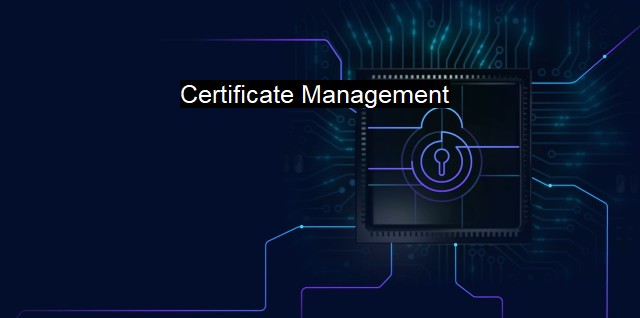What is Certificate Management?
The Critical Role of Certificate Management in Cybersecurity and Antivirus Planning
Certificate management constitutes one of the essential aspects that aids in securing a network and protect critical data. In contemporary digital environments, the significance of certificate management surfaces from its crucial function, which is to ensure secure and encrypted communication. This permits multiple systems to connect with one another and exchange data effectively and securely over the internet.Before delving into the subject, it is paramount first to understand the term 'Certificate'. In simplistic terms, a certificate, also known as a digital certificate or a public key certificate, refers to a digital document that verifies the entity of the bearer. This digital documentation encompasses a public key, an identity associated with the key, and a digital signature of an entity, which has issued the certificate. These entities are known as 'Certificate Authorities,' or 'CAs.'
Certificate management entails the issuance, renewal, revocation, and maintenance of digital certificates within an organization. Each of these processes holds extensive relevance in ensuring the encrypted transmission of data across networks.
Delving more deeply into the topic, the issuance involves a CA deploying a certificate to be utilized for securing data transmissions. Once issued, these digital certificates do not last indefinitely. They come with an expiry date which necessitates certificate renewal. This renewal pertains to re-validating and extending the lifespan of a certificate. On the other hand, when the use of a certificate is terminated prematurely or is no longer trustworthy, it needs to be revoked. Revocation prevents a network or system from utilizing an unsecure, expired, damaged, or compromised certificate to encrypt data. The maintenance of certificates refers to the effective management and consistent monitoring of certificates employed within a network. This maintenance helps in ascertaining that every digital certificate remains updated, efficient, and effectively functional for secure data transmission.
In the context of antivirus applications, certificate management serves to secure the transmission of virus definitions and updates. It could also secure the submission of potential threats from client systems to antivirus vendors. As cyber threats are incrementally evolving sophistication levels, the necessity of effectively managing and maintaining trustworthy certificates becomes evident for all antivirus software providers. This helps to ensure secure communication between antivirus software and servers hosting updates or threat data.
Certificate management is pivotal to businesses since they rely heavily on encryption to secure sensitive data. Without proper certificate management, companies might use outdated or compromised certificates, leading to security vulnerabilities. Large organizations often handle global-scale certificate management through automated solutions. Other companies rely on outsourced certificate management systems to ensure trusted certification.
Adequate certificate management practices help in neutralizing potential problems arising due to the unauthorized issuance or thefts, neglected renewals or misconfigured certificates, thus enhancing data security.
In the landscape of cybersecurity, incidents, where data exchanged across networks has been hacked or breached due to unsecure communication, are not uncommon. Here, an efficient certificate management program becomes crucial. Such practices ensure the organization's continuous possession of secure certificates for uninterrupted, trustworthy, encrypted communication, thereby reducing risks associated with data theft and cyber attacks.
Over time, the ever-increasing sophistication exhibited by cyber threats emphasizes reliable certificate management practices more acute. Expectedly, as organizations are realizing the corrosive impacts a flawed certificate management process can have on security infrastructure, they are vehemently investing time and resources to optimize certificate management systems. the success of these systems is hinged on routine inspection and updates to stay abreast with changing threats, thus safeguarding networks against potential data breaches and maintaining secure cyberspace.

Certificate Management FAQs
What is certificate management in cybersecurity?
Certificate management is the process of managing and maintaining digital certificates used for secure communication on a network. This involves issuing, renewing, revoking, and validating certificates to ensure the security and integrity of data transmission.Why is certificate management important for cybersecurity?
Certificate management is essential for ensuring secure communication and maintaining the trustworthiness of a network. A poorly managed certificate can lead to security breaches or even compromised encryption, rendering the network vulnerable to cyber attacks.What are the best practices for certificate management in antivirus software?
Some of the best practices for certificate management in antivirus software include regular auditing of certificates, updating certificates promptly, and ensuring that all certificates are issued by trusted authorities. It is also essential to monitor certificates and revoke any that are no longer needed or have been compromised.What are the consequences of not properly managing certificates in cybersecurity?
The consequences of not properly managing certificates in cybersecurity can be severe. If a certificate is compromised, it can lead to unauthorized access to sensitive data or even allow attackers to take over the entire network. Additionally, failing to manage certificates can result in compliance violations and legal repercussions.| | A | | | B | | | C | | | D | | | E | | | F | | | G | | | H | | | I | | | J | | | K | | | L | | | M | |
| | N | | | O | | | P | | | Q | | | R | | | S | | | T | | | U | | | V | | | W | | | X | | | Y | | | Z | |
| | 1 | | | 2 | | | 3 | | | 4 | | | 7 | | | 8 | | |||||||